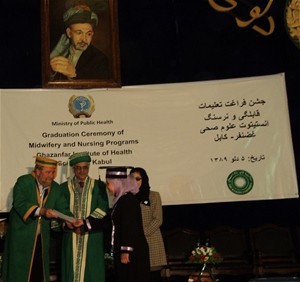Home » Reports & Data » Progress » Transforming Lives » New Midwives and Nurses Join Efforts to Improve Maternal and Child Health in Kabul

USAID Senior Deputy Mission Director Robert Hellyer hands the graduation certificate to a new mid-wife.
USAID/Nazir Abdul
24 JANUARY 2011 | KABUL, AFGHANISTAN
In a graduation ceremony at Ministry of Public Health in Kabul today, 75 Afghan women received certificates for successfully completing the USAID-funded hospital midwifery education program and nine Afghan women received nursing degrees through the Aga Khan University Program in Afghanistan.
Women who enter the two-year hospital midwife education program are selected through the national Concur examination system and must have a least a ninth grade education, good literacy skills, and be between 16 and 30 years of age. After graduation, the new midwives are deployed to hospitals or comprehensive health centers.
Second Vice-President Karim Khalili, Acting Minister of Public Health Dr. Suraya Dalil, USAID Senior Deputy Mission Director Robert Hellyer, Director of Ghazanfar Institute of Health and Sciences Dr. Kymia Azizi, Head of Aga Khan University Programs in Afghanistan, Dr. Parvez Nayani, other Ministry of Public Health officials, and members of the international donor community took part in the ceremony.
Afghanistan has the second highest Maternal Mortality Rate in the world. Approximately every 30 minutes, a mother dies giving birth in Afghanistan, and 77 percent of these deaths are due to factors that could be avoided with proper health care. The neonatal mortality rate is also high in Afghanistan, with 60 newborns out of every 1,000 dying in the first month of life. Vice-President Khalili in his speech asked the international community to continue helping the health sector of Afghanistan.
“Maternal mortality reduction is not solely a health agenda; it’s rather an economical, developmental & social issue. We can’t have a prosperous Afghanistan unless we tackle or address maternal death seriously,” said Acting Minister Dalil.
With multi-donor support and a high-level commitment from the MoPH, the number of midwives in Afghanistan has increased from 467 in 2002 to more than 2,700 today. USAID has helped train 1,478 midwives and developed the midwifery education program utilized by 34 midwifery schools in 32 provinces.
“The United States strongly supports midwifery and nursing education, and believes that increasing the number of skilled health providers in Afghanistan is essential to improving maternal and child health and reaching Afghanistan’s Millennium Development Goal to reduce maternal mortality by 50 percent by 2015. Our support demonstrates our lasting commitment to the people of Afghanistan,” said USAID Senior Deputy Mission Director Hellyer.”
USAID collaborates with the Ministry to support midwifery education programs throughout Afghanistan, and is increasing the number of skilled midwives in an effort to reduce infant and maternal mortality.







Comment
Make a general inquiry or suggest an improvement.